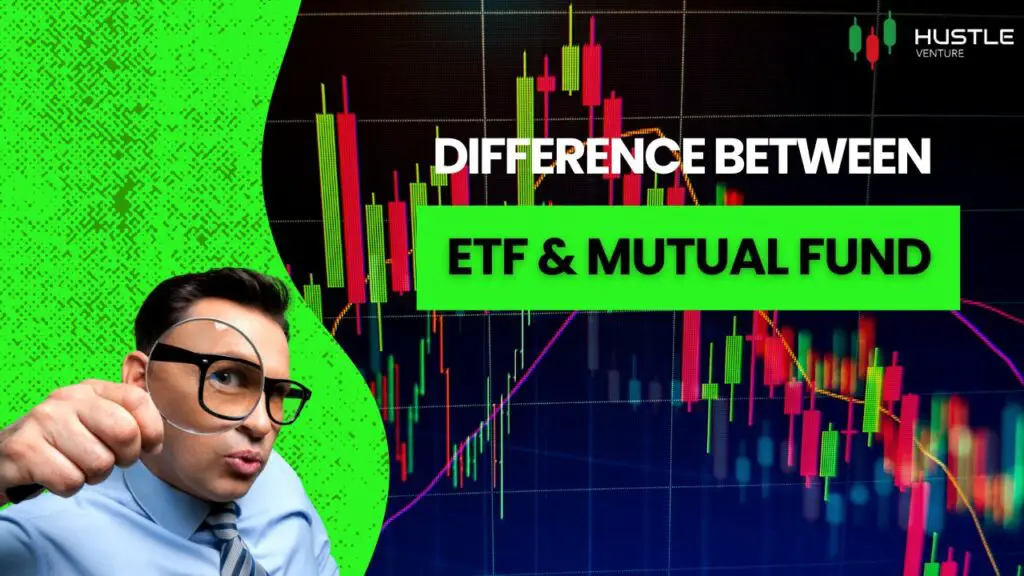ETFs and mutual funds are two easy ways for investors to put their money into a ton of different companies. Essentially, both of these two popular investment vehicles let you pool your fund with other people’s money to buy a bunch of different stocks, bonds, and assets. The idea is to spread your investment around cuts down on risk while still making reasonable profits.
ETFs have exploded in popularity lately thanks to their low fees, tax advantages, and ability to be traded like stocks. But mutual funds have been around for ages and still manage the most total invested cash.
So in this battle of ETF vs mutual fund, which one is better, and why? The answer depends a lot on your specific goals and needs. Let’s first understand them better so that we can evaluate the difference between ETF and mutual funds and figure out what should matter most to you.
What is an ETF?

An ETF is an investment fund that works basically like a stock. It represents a basket of underlying assets—stocks, bonds, commodities, etc.—and behaves just like a stock trading on an exchange.
ETFs are a simple, easy way to get exposure to a whole swath of the market. They give investors instant diversification at a low cost; as an investor, all you have to do is buy your ETF shares and sit back.
The fees for ETFs are dirt cheap as well. Most have expense ratios under 0.5% because they’re passively managed. However, you pay a small spread fee when you trade.
Furthermore, ETFs are tax efficient. Any capital gains are only realized when you sell, not each year, like mutual funds. Therefore, you’re in control of your tax bill.
Now let’s move on to mutual funds.
What is a mutual fund?
This investment tool combines cash from tons of investors and uses that money to buy up all sorts of stocks, bonds, and other assets. When you invest in a mutual fund, your cash goes into a big pool, and a fund manager chooses which investments to make with everyone’s money.
It gives regular folks access to investments, usually available to big-shot institutions. You also get a professional fund manager making trades for you and instant diversification, often for a relatively small amount upfront.
However, the trade-off is higher fees. Mutual fund expense ratios usually range from 0.5% to 2% or more each year, including all the managing and running of the fund.
Mutual funds also tend to be less tax efficient. Fund managers buy and sell investments throughout the year, triggering capital gains that get passed on to you—even if you reinvest the distributions. This happens once a year.
Now that we have a basic understanding of ETFs and mutual funds let’s see how they can be categorized to determine which is better, ETF or mutual fund.
Types of ETFs and mutual funds
ETFs and mutual funds come in different types depending on what assets they invest in.
For example, ETFs are often grouped by the assets they hold:
- Stock ETFs track different parts of the stock market, like large, small, growth, or value stocks and specific sectors.
- Bond ETFs invest in treasury, corporate, and municipal bonds.
- Commodity ETFs focus on physical assets such as precious metals, crops, and energy.
ETFs can also be split into two main categories:
- Index ETFs basically track a market index for a low cost.
- Actively managed ETFs have managers trying to beat the market by picking individual stocks.
Mutual funds usually fall into groups based on what they mainly buy:
- Stock funds invest mostly in company shares.
- Bond funds focus on fixed-income investments.
- Money market funds buy short-term debt for income and liquidity.
Mutual funds can also be sorted by style:
- Index funds mirror a market index for a low cost.
- Actively managed funds have managers picking stocks, hoping to outperform the index.
As we are now well-versed in different types of ETFs and mutual funds, let’s try to find what is the difference between ETFs and mutual funds.
ETF vs Mutual Fund – Key Differences
So ETFs and mutual funds have some similarities but also some big differences that matter a lot.
First, ETFs trade like stocks all day long, while mutual funds only price once at the end of the day after markets close. So ETFs give you more flexibility to time the market.
ETFs further cost you lower. Expense ratios are usually half that of mutual funds.
Tax efficiency is another major difference. ETFs are often more tax efficient since you only pay capital gains taxes when you sell. On the other hand, mutual funds pass on gains annually even if you reinvest.
However, mutual funds give you slightly more choices since there are more fund options. And mutual funds make it easy to dollar-cost average with automatic investing.

Which is better: ETF or mutual funds?
There’s no one answer for all to the question of which is better, ETF or mutual fund. For instance, if you’re a long-term buy-and-hold investor, either ETFs or mutual funds can work well. The lower fees and tax efficiency of ETFs are a plus, but you’ll have fewer fund choices. So it really comes down to personal preference and what you find a more comfortable investment vehicle.
On the flip side, for traders and those after short-term gains, ETFs definitely have the edge. Because they trade intraday-like stocks, you have more flexibility to time the market, hop in and out of positions, and try to capture short-term price movements. Mutual funds don’t offer that ability due to their once-a-day pricing.
However, for beginners, mutual funds may actually be the easier option. They have a long track record, more choices, and make automatic investing very simple. The fund manager handles everything for you. ETFs give you more control but require a bit more research since you’re picking the fund yourself.
Overall, ETFs are best for passive investing, buy-and-hold, or tax-sensitive strategies, and mutual funds work well for set-it-and-forget-it investing, automatic investments, and active stock picking. The bottom line is ETFs and mutual funds each have their sweet spot.
Final words
When it comes down to ETF Vs Mutual Funds, both ETFs and mutual funds can be great ways to watch your money grow over the long haul in the most tax-smart way.
The real key is finding the type of fund that just clicks with you as an investor. That means picking what matches your investing style, needs, and targets.
Remember, though, while ETFs have some definite pluses, mutual funds still make sense for some people. The “better” choice really depends on your situation and what you’re trying to achieve.
Take a minute to think about your financial goals, strategy, and how you feel about fees, taxes, and trading. Then try out both ETFs and mutual funds to see which feels like it fits you best.
If you understand the differences and have an open mind, you’ll be able to figure out which type of fund—ETF or mutual fund—actually works for your specific requirements.
Hope this overview of ETF vs mutual fund was helpful!
Related Articles:
Top Investment Platforms In Singapore: A Comprehensive Review
Investing With Syfe | Probably The Best Robo-advisor
Why Dividend Stocks Is Important In Every Investment Portfolio?





